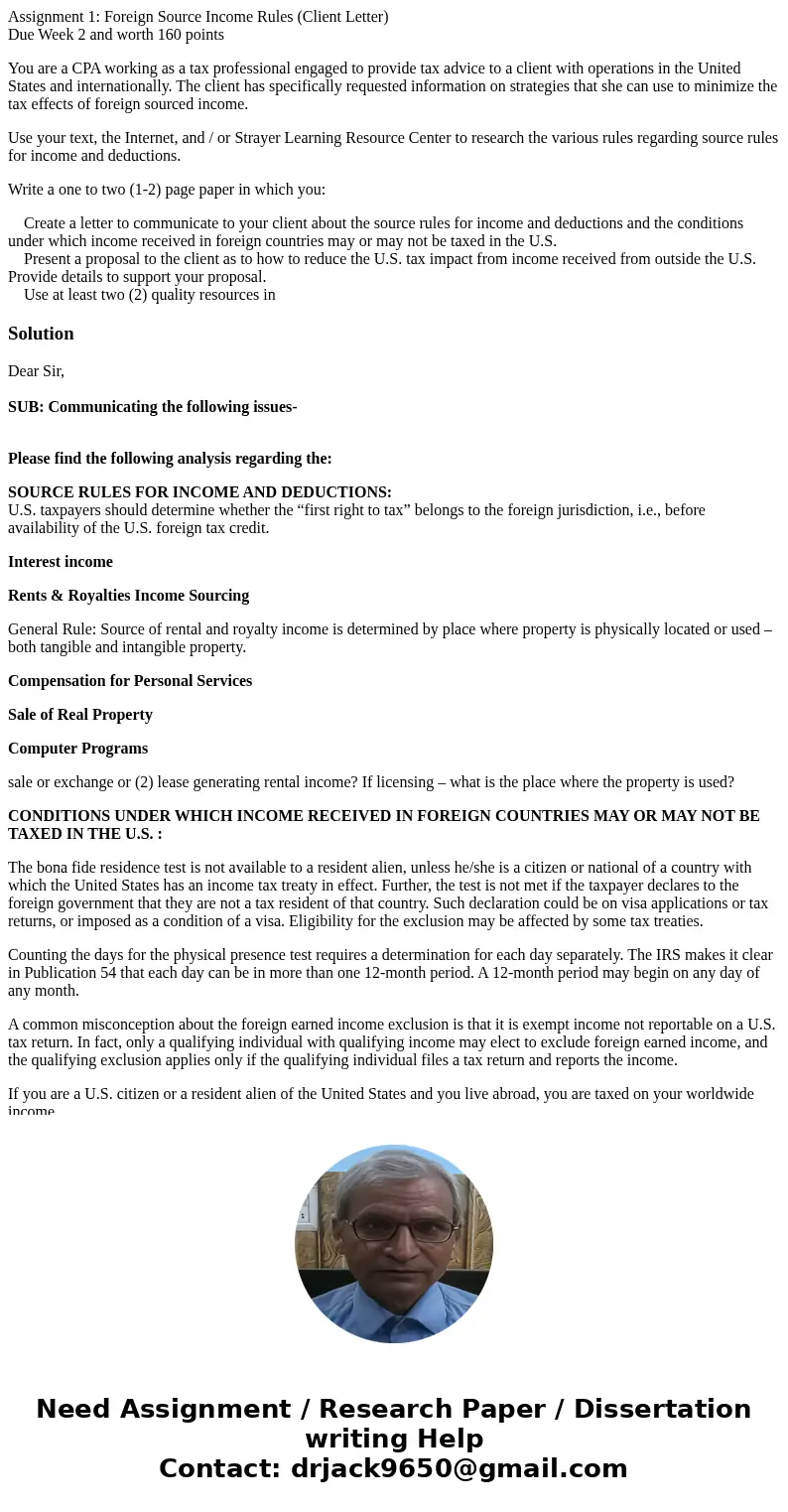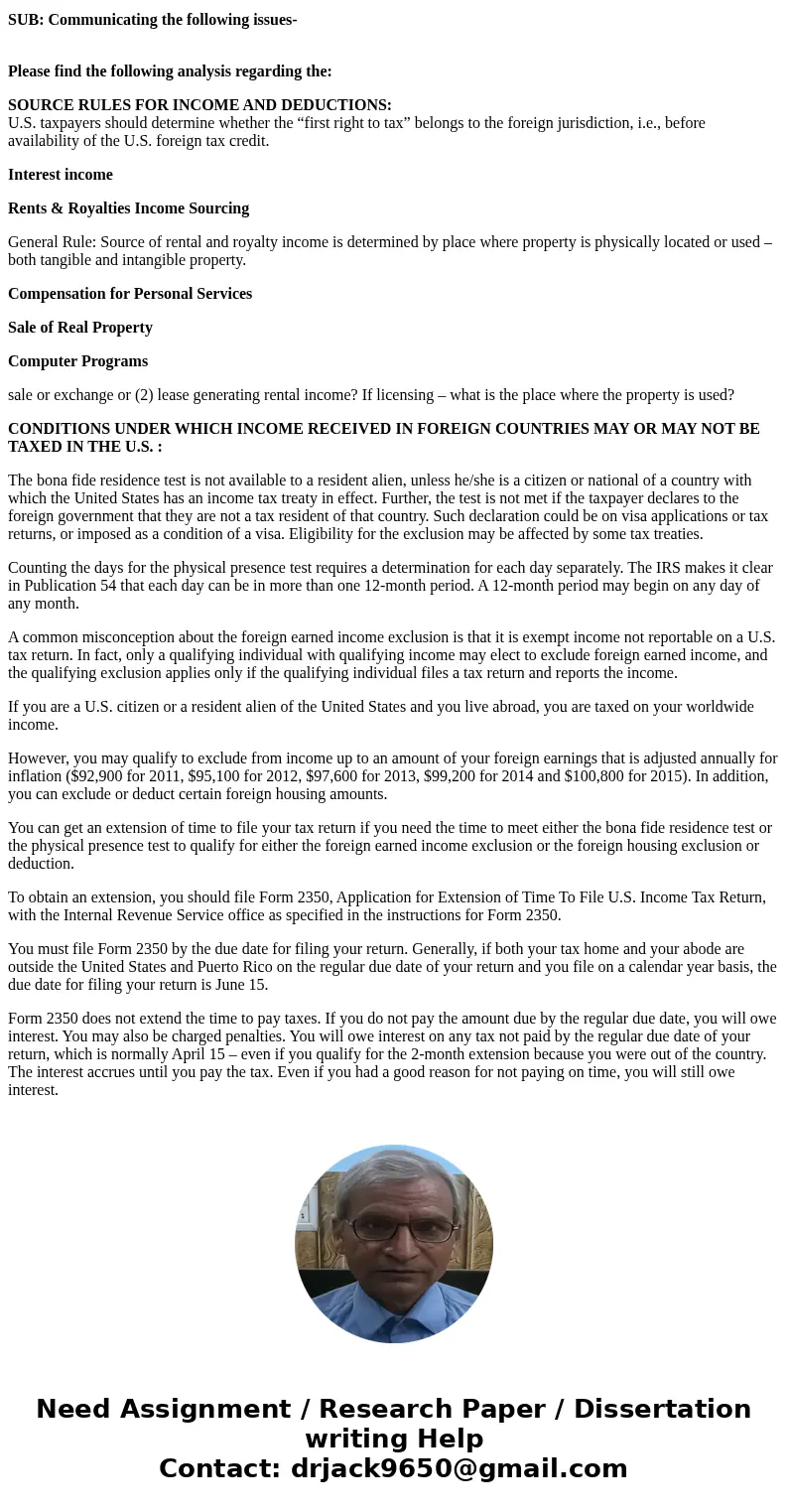Assignment 1 Foreign Source Income Rules Client Letter Due W
Assignment 1: Foreign Source Income Rules (Client Letter)
Due Week 2 and worth 160 points
You are a CPA working as a tax professional engaged to provide tax advice to a client with operations in the United States and internationally. The client has specifically requested information on strategies that she can use to minimize the tax effects of foreign sourced income.
Use your text, the Internet, and / or Strayer Learning Resource Center to research the various rules regarding source rules for income and deductions.
Write a one to two (1-2) page paper in which you:
Create a letter to communicate to your client about the source rules for income and deductions and the conditions under which income received in foreign countries may or may not be taxed in the U.S.
Present a proposal to the client as to how to reduce the U.S. tax impact from income received from outside the U.S. Provide details to support your proposal.
Use at least two (2) quality resources in
Solution
Dear Sir,
SUB: Communicating the following issues-
Please find the following analysis regarding the:
SOURCE RULES FOR INCOME AND DEDUCTIONS:
U.S. taxpayers should determine whether the “first right to tax” belongs to the foreign jurisdiction, i.e., before availability of the U.S. foreign tax credit.
Interest income
Rents & Royalties Income Sourcing
General Rule: Source of rental and royalty income is determined by place where property is physically located or used – both tangible and intangible property.
Compensation for Personal Services
Sale of Real Property
Computer Programs
sale or exchange or (2) lease generating rental income? If licensing – what is the place where the property is used?
CONDITIONS UNDER WHICH INCOME RECEIVED IN FOREIGN COUNTRIES MAY OR MAY NOT BE TAXED IN THE U.S. :
The bona fide residence test is not available to a resident alien, unless he/she is a citizen or national of a country with which the United States has an income tax treaty in effect. Further, the test is not met if the taxpayer declares to the foreign government that they are not a tax resident of that country. Such declaration could be on visa applications or tax returns, or imposed as a condition of a visa. Eligibility for the exclusion may be affected by some tax treaties.
Counting the days for the physical presence test requires a determination for each day separately. The IRS makes it clear in Publication 54 that each day can be in more than one 12-month period. A 12-month period may begin on any day of any month.
A common misconception about the foreign earned income exclusion is that it is exempt income not reportable on a U.S. tax return. In fact, only a qualifying individual with qualifying income may elect to exclude foreign earned income, and the qualifying exclusion applies only if the qualifying individual files a tax return and reports the income.
If you are a U.S. citizen or a resident alien of the United States and you live abroad, you are taxed on your worldwide income.
However, you may qualify to exclude from income up to an amount of your foreign earnings that is adjusted annually for inflation ($92,900 for 2011, $95,100 for 2012, $97,600 for 2013, $99,200 for 2014 and $100,800 for 2015). In addition, you can exclude or deduct certain foreign housing amounts.
You can get an extension of time to file your tax return if you need the time to meet either the bona fide residence test or the physical presence test to qualify for either the foreign earned income exclusion or the foreign housing exclusion or deduction.
To obtain an extension, you should file Form 2350, Application for Extension of Time To File U.S. Income Tax Return, with the Internal Revenue Service office as specified in the instructions for Form 2350.
You must file Form 2350 by the due date for filing your return. Generally, if both your tax home and your abode are outside the United States and Puerto Rico on the regular due date of your return and you file on a calendar year basis, the due date for filing your return is June 15.
Form 2350 does not extend the time to pay taxes. If you do not pay the amount due by the regular due date, you will owe interest. You may also be charged penalties. You will owe interest on any tax not paid by the regular due date of your return, which is normally April 15 – even if you qualify for the 2-month extension because you were out of the country. The interest accrues until you pay the tax. Even if you had a good reason for not paying on time, you will still owe interest.


 Homework Sourse
Homework Sourse